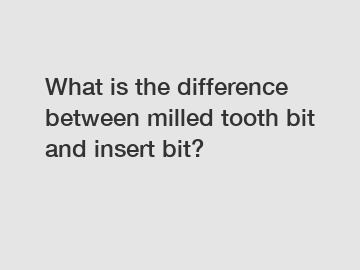What is the difference between milled tooth bit and insert bit?
What is the difference between milled tooth bit and insert bit?
Milled tooth bit and insert bit are two commonly used types of drill bits in the oil and gas drilling industry. While both are designed to drill through different formations, they have distinct characteristics and are suitable for specific drilling conditions.
The main difference between milled tooth bit and insert bit lies in the way they are constructed. A milled tooth bit is made of steel and has rugged, protruding teeth that are milled into the bit's cone. These teeth are designed to effectively scrape, gouge, and crush the rock formations while drilling. On the other hand, an insert bit is made up of a matrix body with hard inserts, usually made of tungsten carbide, strategically placed on the bit's surface. These inserts are designed to provide a cutting action, grinding the rock formations into fine cuttings while drilling.

The difference in construction between the two types of bits leads to variations in their drilling capabilities and performance. Milled tooth bits are known for their robustness and durability, making them suitable for drilling through softer formations such as clays, shale, and sandstone. The rugged teeth on the milled tooth bit are effective in handling abrasive formations, and they can withstand high loads and torque during drilling. However, milled tooth bits may experience difficulty in drilling harder formations, like limestone or dolomite, as the teeth may wear out quickly in such conditions.
Insert bits, on the other hand, are designed for drilling through harder formations, including limestone, granite, and harder sandstone. The hard inserts on the bit's surface provide enhanced cutting capabilities and wear resistance, allowing them to withstand the high compressive forces exerted by harder formations. Insert bits are also less prone to tooth wear and can maintain a more stable drilling performance as compared to milled tooth bits. However, insert bits may not perform optimally in softer formations, as the cutting action may be less effective in generating efficient cuttings for proper drilling fluid circulation.
The choice between a milled tooth bit and an insert bit depends on the specific drilling conditions and the formations to be drilled. Drillers consider factors such as the formation hardness, stability, and economics when selecting the appropriate bit type for a drilling operation. Understanding the differences between milled tooth bits and insert bits allows drillers to make informed decisions and optimize drilling efficiency.
In conclusion, milled tooth bits and insert bits differ in their construction and drilling capabilities. Milled tooth bits are robust and suitable for softer formations, while insert bits are designed for harder formations. The choice of bit type depends on the specific drilling requirements and formations encountered during the drilling process. By selecting the right bit, drillers can enhance drilling efficiency and improve overall operational success.
The company is the world’s best Soft Formations TCI Bit, PDC Drill Bit, Hdd Hole Opener supplier. We are your one-stop shop for all needs. Our staff are highly-specialized and will help you find the product you need.

Comments